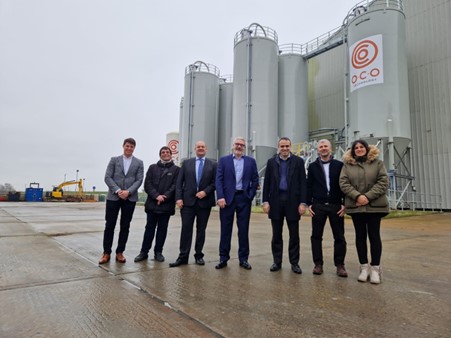O.C.O Technology signs landmark deal with Petronor to develop joint venture facility in Bilbao, Spain
O.C.O Technology has announced a joint venture with Petronor to develop a €20 million facility in the Port of Bilbao.
It will be the first facility in continental Europe to produce carbon negative manufactured limestone aggregate using O.C.O’s patented Accelerated Carbonation Technology (ACT). The process will use CO2 captured from the Petronor refinery to treat municipal waste that would otherwise have been sent to landfill.
Work is due to begin later this year with the plant due to be commissioned in early 2026.
O.C.O CEO Steve Greig believes the partnership is a major step forward in helping the European Energy from Waste (EfW) sector manage its waste materials. European Union (EU) regulations already demand that by 2035, only 10% of municipal waste should be sent to landfill.
Steve said: “This is a hugely important milestone for O.C.O Technology and we are delighted to be working closely with our European partner Petronor. This development marks a number of firsts for us.
“It will be our first large-scale carbon capture and aggregates manufacturing facility in Europe and our first joint venture with the formation of Biscay Eco Aggregates SL (BEA).
“Our innovative processes and products are making a significant difference by contributing to the low-carbon circular economy. We firmly believe that this is just the first of many opportunities to demonstrate how our technology can transform the way the European Energy from Waste sector manages its waste materials.”
Commitment to decarbonisation
O.C.O is a 25% shareholder in BEA, with Petronor holding the remaining 75% stake.
Emiliano López Atxurra, president of Petronor, said: “The plant is, once again, an example of Petronor’s commitment to the goal of decarbonisation based on innovation and technological co-operation.
“We continue the path we have embarked on with real projects and our commitment, in this case to the circular economy and new materials aimed at reducing CO2. We are on a long road, the end of which requires enthusiasm and effort by uniting industry and technology and promoting attractor projects to make decarbonization a strong idea of inclusive humanity.”
As well as being a clear demonstration of the circular economy in action, the ability to produce manufactured limestone reduces the need to quarry natural aggregate. The aggregate is in demand as a more sustainable building material, with typical uses including tiles, building blocks, mortar or non-structural concrete.
Awards
The joint venture project has already won several awards in Spain, including an Innovation Fund Small scale award in 2021, beating over 200 other entries to receive a €3.2m investment.
Earlier this year, a further €1,160,000 came through Basque Government’s Indartu programme, which promotes and supports industrial business developments in industrial transition affected areas of the Basque country.
In May, the project was named as the Most Innovative Project in the field of Technological Innovation at an annual event hosted by the Innpulso Network (Network of Science and Innovation Cities) and Spain’s Ministry of Science, Innovation and Universities, held at Bilbao Exhibition Centre. The joint venture works towards meeting EU objectives set in 2018, which say EU Member States must make efforts to ensure that 55% of municipal waste is recycled in 2025, rising to 60% in 2030 and 65% by 2035. The regulations, in line with the Sustainable Development Goals, indicate that only 10% of municipal waste ends up in landfills in 2035.

Pictured l-r: Eneko San Martin, Angel Velea, Clayton Sullivan-Webb, Steve Greig, Aitor Azuaga, Carlos Pascual and Ainhoa Martin.
